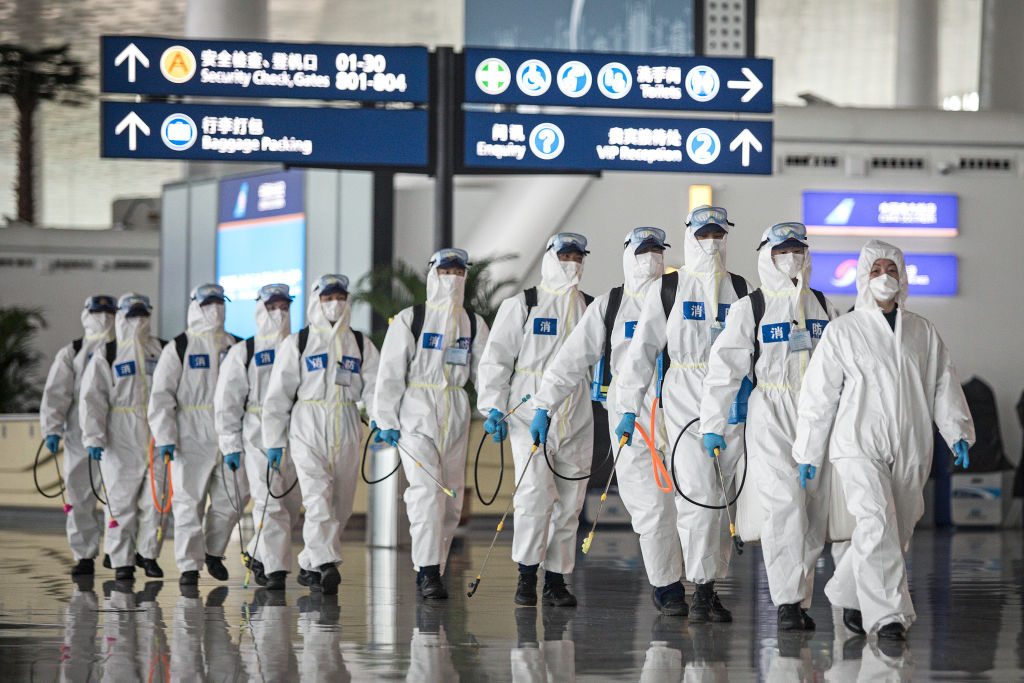It has been a remarkable few days for China’s increasingly absurd and at times chilling zero-Covid campaign. There was outrage on social media after the death of a three-year-old boy from carbon monoxide poisoning, which his father blamed on delays obtaining treatment because of a lockdown. Angry residents who took to the streets were confronted by riot police. While videos from the world’s largest iPhone factory in the central Chinese city of Zhengzhou, where 350,000 are employed, showed workers scaling barricades in what amounted to a mass break-out following attempts to lock them in their dormitories after a Covid outbreak.
A surge in cases across the country has seen restrictions imposed in 28 cities, home to more than 200 million people. They range from Xining and Lhasa in the west, to Beijing, Guangzhou, and even Wuhan – where the virus was first detected almost three years ago. There have been the now familiar appeals for food and medical supplies from those locked in their homes or in the vast quarantine facilities sprouting across China.
Like China’s cruel and crude attempt at population control, zero-Covid has become an industry in itself
Yet stock markets in Shanghai and Hong Kong bounced last week on rumours that Beijing might ease its zero-Covid policy, that it had finally seen sense in the face of growing anger and frustration. It seemed like wishful thinking on the part of investors who have been heading for the exits almost as rapidly as the hapless iPhone workers. And that is how it proved on Saturday when a spokesperson for the National Health Commission told a much-anticipated press conference in Beijing that there would be no wavering. China will ‘unswervingly adhere’ to the zero-Covid policy, which is ‘completely correct’, she said.
She was echoing the words of Xi Jinping, who a few days earlier described zero-Covid as a ‘people’s war to stop the virus’. In his speech to the Communist party congress he gave not so much as a nod towards the economic and social pain caused by a policy that has become part of the cult of Xi. It was as if the endless lockdowns, waves of mass testing, and the claustrophobic restrictions and surveillance, where all to be celebrated, a mark of party virility, the new normal for Xi’s China.
The ‘people’s war’ rhetoric was reminiscent of the era of Mao Zedong and the Cultural Revolution. Except instead of fanatical red guards waving little red books, Xi is deploying an army of fanatical white guards, the hazmat-suited enforcers of zero-Covid banging down doors and waving their swabs and thermometers before dragging people away to quarantine.
It’s a tempting analogy, but a more accurate one might be the now discarded one-child policy. Like China’s cruel and crude attempt at population control, zero-Covid has become an industry in itself with its own enormous bureaucracy and army of zealous enforcers, whose work is a measure of loyalty to the party and its leader. As with one-child, abuse has become routine, and voices warning of the obvious economic damage are suppressed or ignored. The one-child policy sought to control women’s bodies, zero-Covid is about broader social control. Both seek to tightly constrain the way people live their lives. Like one-child, zero-Covid has developed a political logic of its own, divorced from its original purpose of protecting health – a Frankenstein monster of a policy.
The one-child policy was implemented in 1980, requiring couples from China’s ethnic Han majority to limit themselves to a single child. At its height, family planning agencies employed an estimated eight million people, right down to village level, where local officials intruded into the most intimate corner of people’s lives. Women were forcibly sterilised, fitted with intrauterine devices and coerced into abortions. Officials dished out so many fines to those who broke the rules that by one estimate, they were bringing $5 billion into local coffers every year, and lining their own pockets in the process.
As with zero-Covid, the one-child policy was accompanied by a barrage of propaganda with slogans depicting it as battle for national survival. ‘fewer and better births, a service to the nation’, was typical of the one-child era. For those facing Covid lockdowns, the platforms carrying the slogans have changed but the barrage online, on television and on social media remains the same. There are exhortations to ‘Extinguish every outbreak!’, saying that ‘History will remember those who have contributed!’ and warning against ‘war-weariness and wishful thinking’. Other one-child era slogans were more threatening: ‘If you don’t get sterilised, your house will be demolished’ and ‘If you escape (sterilisation), we’ll hunt you down; if you want to hang yourself, we’ll give you the rope,’ villagers were warned.
The one-child policy lasted for 35 years, during which the communist party ignored warnings from academics and others of a looming demographic disaster and a damaging gender imbalance as a result of the selective abortion of girls. In 2015 the party relented, and married couples were told they could have two children, though the hated family planning bureaucracy, so vast and deeply embedded, was kept in place to administer the new rules. Last year, the party announced it would allow three children. But it was still family planning by diktat, and it was anyway too late. Chinese women were choosing smaller families, or no children at all, and the predicted demographic disaster has arrived, with the population shrinking and rapidly aging, with potentially devasting impact on the economy in the years ahead.
Xi is trapped by the monster he has created
The surveillance of the one-child era was labour intensive, as is zero-Covid where enforcement has also handed draconian powers to local governments to control their neighbourhoods. There are no figures for the size of the zero-Covid bureaucracy, but it is likely far larger than one-child ever was. On the eve of the congress, Liang Wannian, a leading epidemiologist, said that China now has the capacity to test one billion people in a single day. He added that there is ‘no timeline’ for an exit from zero-Covid rules. There is now a vast network of quarantine facilities, and as in the one-child era, zealous government workers and volunteers have gone door to door monitoring and reporting on residents’ activities. This is complemented by the technology of the surveillance state, from facial recognition cameras to apps tracking and following every move and contact, to drones roaming between apartment blocks barking instructions.
As was the case with the one-child policy, there are lonely voices warning about the damage from endless zero-Covid lockdowns, which have become symptomatic of a China increasingly turning in on itself. The economy is grinding to a halt, but the impact is not only economic. Lu Lin, president of Peking University’s Sixth Hospital has warned that the toll on mental health could last for two decades. He said a third of residents who had isolated at home had experienced depression, anxiety and insomnia. The number of young people affected – the one-child generation – is particularly large, with the education ministry estimating that in 2020 some 220 million Chinese children and young people have been confined for long periods. A Fudan University survey earlier this year of almost 5,000 young people found that 70 per cent expressed varying degrees of anxiety. The impact has been worsened by the frequent separation of children from their parents during their forced quarantine.
The economic fallout from trying to keep the number of Covid cases as close as possible to zero has hit the job prospects of young people. Official figures show urban unemployment of almost 20 per cent, and a growing number of youngsters are dropping out of the labour market altogether. Numbers are hard to come by, but it is generally agreed there has been a sharp increase in tangping, which translates as lying flat, and refers to disillusioned youngsters who turn their backs on the ultra-competitive lifestyle and conventions of modern China.
On the eve of the Communist party congress last month, Beijing saw a rare protest, a man unfurling a banner on a bridge in the capital that read, ‘No Covid test, we want to eat. No restrictions, we want freedom. No lies, we want dignity.’ It was quickly taken down and photographs scrubbed from the internet.
Last month a video emerged of shoppers in a Shanghai branch of Ikea stampeding towards the exits, barging security officers out of the way after the authorities tried to seal off the store and send everybody in it to quarantine because a shopper had been exposed to a six-year-old who had an asymptomatic dose of Covid-19. Feelings are particularly raw in China’s financial capital after a two-month lockdown earlier this year, during which people died because of lack of access to health care. There were food shortages and residents were barricaded in their apartment buildings. The man responsible for that, Shanghai party boss Li Qiang, has now been rewarded by Xi for his zero-Covid fanaticism with a promotion to the party’s seven-man standing committee. He is expected to be confirmed as premier early next year, making him Xi’s number two.
In another Shanghai video, an official is heard yelling at a family, ‘If you do not obey the city’s orders, your punishment will affect your family for three generations!’ One man replies, ‘That’s fine. We are the last generation anyway’. Soon afterwards the hashtag #lastgeneration began to circulate, taken up in particular by young people as a form of protest, stressing their reluctant to have or raise children in Xi’s China.
Xi is trapped by the monster he has created, but also by China’s low vaccination rates among the elderly – less than two-thirds of those over 60 are fully vaccinated – and his stubborn resistance to allowing the import of more effective foreign vaccines.
Nobody expects zero-Covid to last as long as the one-child policy, although Cai Qi, the communist party secretary of Beijing said recently that he expected it to continue ‘for the next five years’, comments he then sought to rein back on after a social media outcry. He too has now been promoted to the party’s standing committee. The damage to economic livelihoods could be severe, and increasingly difficult to recover from the longer it continues. As with the one-child policy, zero-Covid is more and more about politics and a hunger for social control, whatever the initial intentions. Like one-child before it, zero-Covid has become a key part of party dogma, but it is also more closely associated with the fanaticism of a single man for whom ‘persistence is victory’. That makes an orderly retreat by Xi difficult if not impossible.







Comments